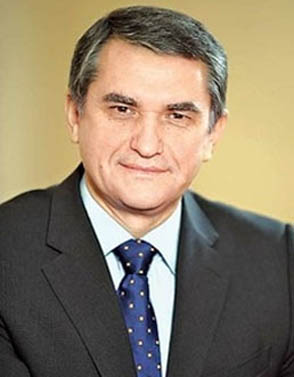Policy Advisor Warns of Secession Danger
As Ukraine establishes a transitional government to replace the fallen President Viktor Yanukovych, the country still risks turmoil and violence in the south and east, Yanukovych’s ethnic Russian base of support. There, local political groups demand closer ties to Russia, and even separation from Ukraine, noted Oleh Shamshur, a Ukrainian diplomat who advises political party leader Vitaliy Klitschko. “The area which we should watch very carefully now is Crimea,” the strategically vital peninsula on Ukraine’s southern, Black Sea coast, said Shamshur, a former ambassador to the United States, in an online discussion Friday with the Atlantic Council.
Russia is intent on keeping its massive naval base at the Crimean port of Sevastopol, and Russian nationalists view the peninsula as part of greater Russia. Shamshur noted the statement last week by the speaker of Crimea’s regional parliament, Volodymyr Konstantinov, in which he spoke of seeking Russian protection amid Ukraine’s crisis. “The statement by the head of the Crimean parliament in Moscow was tantamount to … [a] call for separation from Ukraine and joining Russia,” Shamshur said.
In the eastern oblast, or province, of Kharkiv, pro-Russian politicians recently have been “convening [meetings] with the idea that if democracy wins in Kyiv, they would be … thinking very seriously of creating a separate state or quasi-state entity in the east and southeast of Ukraine,” Shamshur said. “That’s something that should be taken very seriously. I do believe that we can put our house in order ourselves. But these attempts … especially if amplified from the outside, are extremely dangerous.”
US National Security Advisor Susan Rice said on NBC’s “Meet the Press” Sunday that a Russian intervention military intervention in Ukraine would be “a grave mistake.” Yanukovych, who fled Kyiv Friday, has been reported in Crimea, news agencies reported.
Shamshur, who was ambassador in Washington from 2005 to 2010, and who also has served as deputy foreign minister, answered questions from Atlantic Council members, journalists and the public in a discussion moderated by the Council’s executive vice president, Damon Wilson. Among his observations were these:
- RUSSIA IS FOMENTING THE VIOLENCE AND THE CRISIS. The government of Russian President Vladimir Putin pushed Yanukovych not to sign the association agreement that it had negotiated in the past year, the decision that ignited the protest in November. In more recent days, “the role played by the Russian leadership in this crisis is, was, I would even say, unsavory, in the sense that they went as far as encouraging the violent crackdown on the demonstrators publicly.” The Russian state-dominated press has referred to the protesters as “extremists and scoundrels, and implicitly they deserve what they get,” he said.
- THE US AND EU ROLES HAVE BEEN POSITIVE, BUT CAME LATE. Shamshur noted the US and EU governments’ steps to sanction financial activities by Yanukovych and his key allies, and to ban them from receiving travel visas to their countries. “The imposition of sanctions by the United States and then by the European Union has been quite helpful, and I think it was one of the factors that led to the decision of Yanukovych to accept even [the idea of] deal-making per se,” Shamshur said. “But I think … it was a bit too late. A couple of days ago, … was a chance, by using those sanctions, especially financial sanctions, to modify the behavior of Yanukovych and his entourage. Now we are mostly dealing with the results of this inaction. What was achieved might have been much greater and, most importantly, it might have prevented the bloodshed, at least the scale of the bloodshed, that we have seen in the streets of Kyiv.” Of the US and EU sanctions, he said, “It was maybe not too little, but definitely too late.”
- THE PROTEST MOVEMENT IN KYIV MAY CONTINUE UNTIL NEW ELECTIONS ARE HELD. Now, “what is demanded by the people in the streets, by the majority of the people, is a total re-set of the country’s power structure … so that Ukraine can evolve, eventually and finally, into a mature democracy,” he said.
